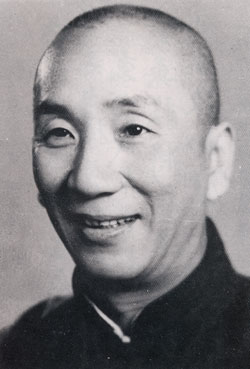
Ip Man, also known as Yip Man, was a Hong Kong-based Cantonese martial artist and a grandmaster of the martial art of Wing Chun when he was 20. He had several students who later became martial arts masters in their own right, the most famous among them being Bruce Lee.
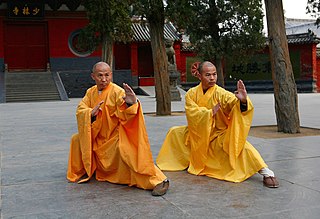
Hung Ga (洪家), Hung Kuen (洪拳), or Hung Ga Kuen (洪家拳) is a southern Chinese martial art belonging to the southern Shaolin styles. The hallmarks of Hung Ga are strong stances, notably the horse stance, or "si ping ma" (四平馬), and strong hand techniques, notably the bridge hand and the versatile tiger claw. Traditionally, students spent anywhere from several months to three years in stance training, often sitting only in horse stance from half an hour to several hours at a time, before learning any forms. Each form could then take a year or so to learn, with weapons learned last. In current times, this mode of instruction is generally considered impractical for students, who have other concerns beyond practicing kung fu. However, some instructors still follow traditional guidelines and make stance training the majority of their beginner training. Hung Ga is sometimes mischaracterized as solely external—that is, reliant on brute physical force rather than the cultivation of qi—even though the student advances progressively toward an internal focus.

Wong Kei-ying or Huang Qiying was a Chinese Hung Ga martial artist and physician of Cantonese ethnicity, who lived during the Qing dynasty. He was one of the Ten Tigers of Canton. He was best known for his use of the Tiger Crane Paired Form Fist skill set. His son, Wong Fei-hung, who inherited his martial arts and medical skills, is commonly portrayed as a folk hero in Chinese popular culture.

Ten Tigers of Canton or Ten Tigers of Guangdong refers to a group of ten Chinese martial artists from Guangdong Province lived around the 19th century during the Qing dynasty in China. They were said to be the greatest fighters in Guangdong during the Qing era. Much of their existence has been embellished by folk legends and stories passed down from generation to generation.
Chan Wah-shun, nicknamed Money Changer Wah (找錢華) and Money Clutcher Wah (爪錢華), was a student of the Wing Chun grandmaster Leung Jan (梁贊). He is noted for being the martial arts teacher of Ip Man.

Leung Jan was a Chinese martial artist and Wing Chun practitioner from Heshan, Guangdong. He was known in Foshan as Mr. Jan of Foshan and King of Wing Chun Kuen.
Yim Wing-chun is a Chinese legendary character, often cited in Wing Chun legends as the first master of the martial art bearing her name. Wing-chun, though a person's name in Chinese language, translates literally to "spring chant", or may be substituted with the character for "eternal spring".
There are at least eight distinct lineages of Wing Chun, these are mostly little-known outside of the People's Republic of China, and each has its own history of origin. In the West, Wing Chun's history has become a mix of fact and fiction due to the impacts of early secrecy and modern marketing. Additionally, there are competing genealogies within the same branch or about the same individual teacher.

Hung Hei-gun or Hong Xiguan (1745—1825) was a Chinese martial artist who lived in the Qing dynasty. He was also an influential figure in the Southern Shaolin school of Chinese martial arts. His name is also alternatively romanised as Hung Hei-koon, Hung Hei-kwun, Hung Hsi-kuan, and similar renditions. He was believed to be the creator and founder of Hung Ga Kuen.

Lam Sai-wing was a Hung Gar martial artist. He was a student of the Chinese martial artist, acupuncturer and folk hero of Cantonese ethnicity, Wong Fei-hung.
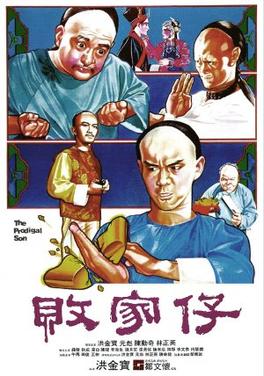
The Prodigal Son is a 1981 Hong Kong martial arts comedy film starring Yuen Biao and directed by Sammo Hung, who also co-starred and wrote with Barry Wong. The film was released on 22 December 1981 and grossed HK$9,150,729. The Prodigal Son was nominated for two Hong Kong Film Awards and won the award for Best Action Choreography.

Five Shaolin Masters a.k.a. 5 Masters Of Death is a 1974 Shaw Brothers kung fu film directed by Chang Cheh, with action choreography by Lau Kar Leung and Lau Kar Wing.
So Chan, also known by his nickname Beggar So, was a Chinese martial artist and folk hero who lived during the late Qing dynasty. One of the Ten Tigers of Canton, he was best known for his drunken boxing.

Gods of Honour is a Hong Kong television series adapted from the 16th-century novel Fengshen Bang, a Chinese vernacular classic written by Xu Zhonglin and Lu Xixing. The series was first aired on TVB Jade in Hong Kong in 2001. It starred Benny Chan, Chin Kar-lok, Irene Wan, Michelle Ye, Dickson Lee, Yuen Wah, Kingdom Yuen and Winnie Yeung in the lead roles.
Ng Mui (Chinese: t 伍枚, p Wú Méi; Cantonese: Ng5 Mui4) is said to have been one of the legendary Five Elders—survivors of the destruction of the Shaolin Temple by the Qing Dynasty.
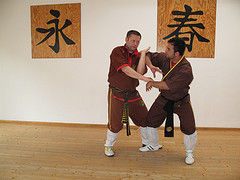
Weng Chun Kung Fu is a Southern-style Chinese Martial Art.
The Red Boat Opera Company was a group of traveling Cantonese opera singers who toured China in the late 1800s and early 1900s.
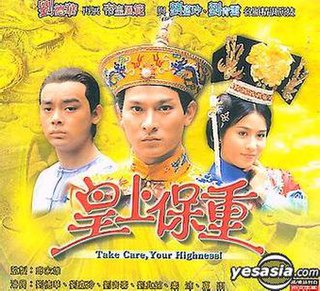
Take Care, Your Highness! is a 1985 Hong Kong historical drama television series produced by TVB and starring Andy Lau in the title role of Kin-lung Emperor, the sixth emperor of the Qing Dynasty. The series focuses on the power struggle in the Imperial Qing Palace, telling the story of righteous folks while also presenting a hesitant love story.
Leung Bik, also known as Mr. Bik (先生璧), was a Wing Chun martial artist. He was one of Ip Man's teachers.
Wong Wah-bo was a martial artist and an opera singer of the late Qing Dynasty. Wong Wah-bo is a notable figure in development of martial art Wing Chun, which is known for its poorly documented history, and is recognized as being part of various contemporary Wing Chun lineages' history.









